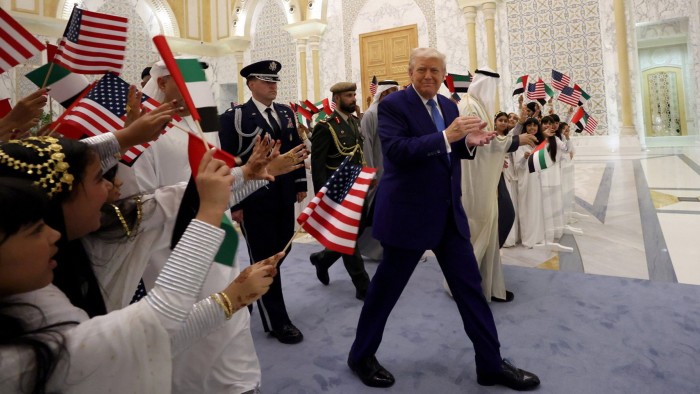Unlock the White House Watch newsletter for free
Your guide to what Trump’s second term means for Washington, business and the world
The writer is the author of ‘Chip War’
Donald Trump’s dealmaking tour of the Middle East last week saw the sales of Boeing aircraft, the signing of defence contracts and the announcement of oil investments. But the most significant decision may be to allow hundreds of thousands of AI chips to flow to the region.
The US will now allow Nvidia to sell 500,000 AI chips per year to the UAE, according to media reports, while at least 18,000 will be transferred to Saudi Arabia. By comparison, Elon Musk’s world-leading Colossus data centre in Tennessee currently has 200,000 high-end chips on site. If the UAE imports half a million high-end chips annually, by the end of the decade its capacity might outstrip the US-based Stargate project, the joint venture between OpenAI and SoftBank, according to Rand Corporation AI expert Lennart Heim.
The decision to let Middle Eastern countries acquire top-notch computing clusters is a major reversal. The US government previously saw Saudi Arabia and especially the UAE as AI rivals and friends of China. Yet before leaving for the Middle East, Trump repealed the rule that had limited chip transfers to the region in favour of a new policy of bilateral dealmaking.
In Washington there were three risks cited to justify limiting chip sales to the Middle East: that the region’s autocrats would use AI to violate human rights; that computing capacity would be diverted to China; and that generously subsidised data centres in the Middle East would crowd out investment in America’s own AI infrastructure.
Trump declared in Riyadh that “we are not here to lecture”. Either way, the link between AI infrastructure and human rights was never very clear. The region’s autocrats have plenty of experience locking up dissidents and repressing minorities even in the absence of high-tech tools.
More complex are ties to China. Both Saudi Arabia and the UAE have previously said they will cut ties with China to obtain better access to American tech. Yet both countries have every incentive to play Beijing and Washington off one another. It was less than a year ago that the UAE air force conducted joint military exercises with the PLA in Xinjiang, the epicentre of the Chinese government’s efforts to harness technology for repression. Saudi officials reportedly requested in negotiations this month to deploy Huawei equipment in data centres with US AI chips.
Much therefore hinges on the efficacy of US monitoring mechanisms. Eighty per cent of the chips deployed in the UAE will be in data centres operated by American companies, according to media reports. The US has a shaky record of export control enforcement, illustrated by reports this year that a Huawei shell company illicitly procured millions of chips from Taiwanese chipmaker TSMC.
Despite these risks, Trump has highlighted the ways his dealmaking is good for business. It certainly benefits semiconductor companies like Nvidia, which will sell more chips, and US cloud computing companies, which will get capital, land and power to build AI clusters across the region. In exchange, Middle Eastern money is supposed to flow into America’s AI sector. Some already has. Emirati investment vehicle MGX has been a big investor in OpenAI, for example.
Yet Trump and Middle Eastern leaders now promise vastly more. The White House says the UAE, Qatar and Saudi Arabia will invest $1.4tn, $1.2tn and $600bn respectively across sectors including technology.
These are huge numbers with sparse details. Even a fraction of these sums could be transformative. But the impact of Trump’s dealmaking will depend on whether his Gulf partners actually invest billions in America’s AI infrastructure, or whether they focus their spending on building their own data centres and tech companies instead.
